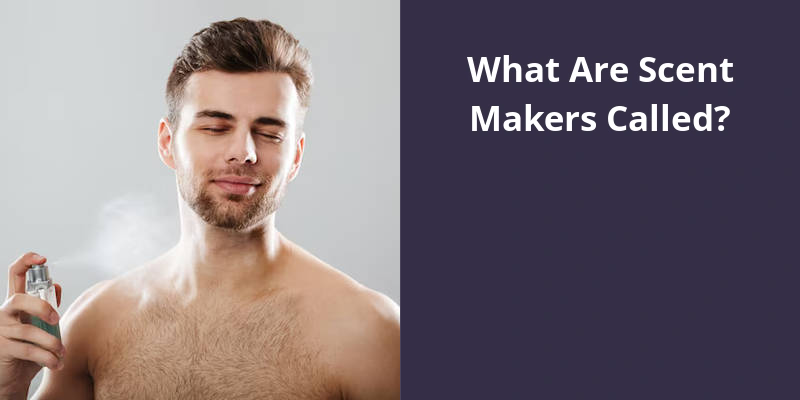Scent makers are typically referred to as “perfumers” or “noses.” They work in the fragrance industry to create new and appealing scents for various purposes such as perfumes, colognes, scented candles, and other fragrance-based products. This profession requires a keen sense of smell and deep understanding of different fragrant elements to create unique and pleasing aromatic combinations. So essentially, the people who take up the art and science of scent creation, skillfully mixing different essences to produce a desirable fragrance, are known as perfumers or noses.

What Are Perfume Scientists Called?
Perfumers, also known as fragrance scientists, are highly skilled individuals who dedicate their careers to the art and science of creating pleasing fragrances. These experts possess a deep understanding of the various materials and compounds used in perfumery, as well as the ability to blend them together in creative and innovative ways. Their expertise lies in their keen sense of smell, along with a thorough understanding of the chemical properties of different substances.
In addition to developing fragrances for perfumes, many perfumers also create scents for various other applications. They may work on formulating fragrances for personal care products, such as shampoos, soaps, and lotions, as well as household goods like candles, air fresheners, and laundry detergents. Their skill set enables them to adapt their knowledge to different industries, creating scents that enhance the consumers sensory experience in a wide range of products.
Fragrances are unique artistic creations crafted by a diverse group of individuals known as fragrance creators. These talented professionals, including perfumers, scientists, chemists, marketers, and many others, collaboratively work within the industry to bring enchanting scents to life. Their combined expertise and passion for olfactory innovation result in the delightful fragrances that bring joy and sensory experiences to people worldwide.
What Are Fragrance Creators Called?
Fragrances are the harmonious blend of art and science, carefully crafted by a diverse group of professionals. At the heart of the fragrance industry, we find perfumers, the true visionaries and artists responsible for creating captivating scents. These fragrance creators possess an extraordinary skill set, combining their olfactory expertise with a deep understanding of chemistry and the raw materials at their disposal.
Furthermore, the fragrance industry relies on the expertise of marketers who understand the intricacies of the market and consumer preferences. Through extensive research and analysis, they identify trends, predict consumer behavior, and strategically position fragrances in the market.
Beyond these key players, there are numerous other individuals involved in the fragrance-making process. This includes evaluators, who meticulously assess and evaluate fragrances, ensuring they meet desired standards. Creative directors provide artistic direction and guidance, shaping the overall vision for a fragrance. Formulators, on the other hand, bring together the raw materials and establish the optimal formula for the desired scent.
Fragrance Bloggers and Influencers: With the Rise of Social Media, Fragrance Bloggers and Influencers Play a Significant Role in Shaping Consumer Perceptions and Preferences. They Provide Reviews, Recommendations, and Insights Into the Fragrance Industry, Influencing Purchasing Decisions.
- Fragrance bloggers and influencers have a strong presence on social media platforms.
- They’ve a large following and engage with their audience through reviews, recommendations, and insights.
- Their opinions and expertise help consumers make informed decisions when purchasing fragrances.
- Fragrance bloggers and influencers often collaborate with brands, promoting new releases and sharing their thoughts on the latest trends.
- They provide valuable information about the fragrance industry, such as ingredient knowledge, scent profiles, and perfume history.
- Consumers trust the opinions of fragrance bloggers and influencers, considering them as reliable sources for fragrance recommendations.
- They contribute to the growth and popularity of niche and independent perfume brands.
- Fragrance bloggers and influencers influence consumer preferences and the overall perception of certain fragrances.
- Brands recognize the impact of these influencers and often send them free products or collaborate with them on sponsored content.
- The rise of fragrance bloggers and influencers has transformed the way consumers discover and purchase fragrances.
Source: Perfumer – Wikipedia
These synthetic chemicals are carefully designed and synthesized to replicate the desired fragrance. Each ingredient is chosen for it’s ability to create a specific note or aroma, resulting in a unique perfume formulation. However, it’s important to note that the use of synthetic chemicals may vary depending on the brand and type of perfume being produced.
What Is Used in Manufacturing of Artificial Perfumes?
These chemicals are often derived from petroleum or other organic compounds and undergo a complex process of synthesis to produce the desired fragrance. The use of synthetic chemicals allows perfumers to create a wide range of scents that may not be found in nature.
One of the main ingredients used in the manufacturing of artificial perfumes is alcohol. Alcohol acts as a solvent that helps to dissolve and distribute the fragrance oils evenly. It also helps in preserving the fragrance and gives the perfume it’s characteristic sprayable form.
Coal and tars are another set of resources that can be utilized in the manufacturing process. Coal-derived compounds like coal tar and it’s distillation by-products can provide certain aromatic properties that are useful in perfumery. These resources are often used as fixatives or to enhance the longevity of the fragrance.
Petrochemicals, derived from petroleum, also play a significant role in the production of artificial perfumes. They provide a wide variety of fragrance notes and help create complex scent compositions. Petrochemicals like toluene, benzene, and styrene are common examples used in the industry.
In addition to these materials, there are various other substances and additives that contribute to the manufacturing of artificial perfumes. These can include stabilizers, emulsifiers, preservatives, and colorants to enhance the overall quality and aesthetic appeal of the fragrance.
Perfumers carefully select and blend these ingredients to achieve the desired scent profile while ensuring the safety and stability of the final product.
Making a perfume is a meticulous process that encompasses various steps, such as ingredient collection, oil extraction, blending, aging, and quality control. It’s a labor-intensive and time-consuming endeavor, akin to crafting a fine wine. Fascinatingly, many popular perfume brands still employ ancient techniques in their manufacturing processes, adding a touch of tradition to the creation of these fragrances.
What Is Perfume Manufacturing?
Perfume manufacturing is an intricate and fascinating process that involves multiple stages. The first step is collecting the ingredients, which can include a wide range of natural and synthetic substances. These ingredients are carefully selected for their scent profile and compatibility with each other.
Next, the process of extracting oils begins. This step is crucial as it involves obtaining the essential oils from flowers, fruits, or other aromatic sources. These oils are the heart and soul of perfumes, and their extraction requires precision and expertise. Traditional methods like distillation and enfleurage are often utilized to preserve the integrity of the oils.
Once the oils are obtained, the perfumer moves on to the blending stage. This is where the creativity and artistry come into play. Different oils are combined in specific ratios to create the desired scent composition. It’s a delicate balance of top notes, middle notes, and base notes, each chosen to harmonize and evolve over time.
After the blending is complete, the perfume undergoes a process of aging. This is an essential step, as it allows the different ingredients to mingle and develop their unique characteristics. The perfumer carefully monitors the aging process to ensure that the fragrance reaches it’s optimal quality and complexity.
Finally, the perfume goes through rigorous quality control measures to ensure it’s consistency and performance. These tests involve evaluating the fragrances longevity, projection, and overall sensory experience. Only after passing these tests will the perfume be deemed ready for bottling and distribution.
From collecting the ingredients to blending, aging, and quality control, every step is undertaken with precision and care. It’s a craft that combines ancient techniques with modern technology to create exquisite scents that captivate our senses. So, the individuals involved in this intricate process can rightly be called scent makers, as they’re the artisans behind the creation of these captivating fragrances.
The Art and Science of Creating Perfume Fragrances
The art and science of creating perfume fragrances is known as perfumery. Perfumers, also called nose or scent makers, are skilled professionals who create unique and appealing scents by combining a variety of aromatic compounds. They carefully blend natural ingredients, such as essential oils extracted from flowers, fruits, and resins, with synthetic chemicals to produce captivating fragrances. Perfumers possess a deep understanding of olfactory perceptions, composition techniques, and the characteristics of individual fragrance notes. They experiment with different combinations, adjusting ratios and concentrations to create a harmonious and well-balanced scent. The process of creating a perfume involves multiple trials, rigorous testing, and refining of the formula until the desired fragrance is achieved. Perfumers play a vital role in the fragrance industry, using their creativity and knowledge to produce scents that evoke emotions, enhance personal experiences, and capture the essence of beauty.
Conclusion
In conclusion, the professionals who dedicate their lives to the art of creating scents are known as perfumers. These scent makers, often referred to as "noses" in the industry, possess an unparalleled sense of smell and possess remarkable skills in producing unique olfactory compositions. Their expertise and creativity bring to life the captivating fragrances that we all enjoy and cherish. Whether it be a delicate floral scent or a bold and invigorating aroma, perfumers employ their talent and passion to craft an endless array of olfactory experiences that captivate our senses. As we appreciate the beauty and complexity of perfumes, it’s important to recognize and celebrate the artistry and skill of these talented scent makers who bring these fragrant creations to life.





